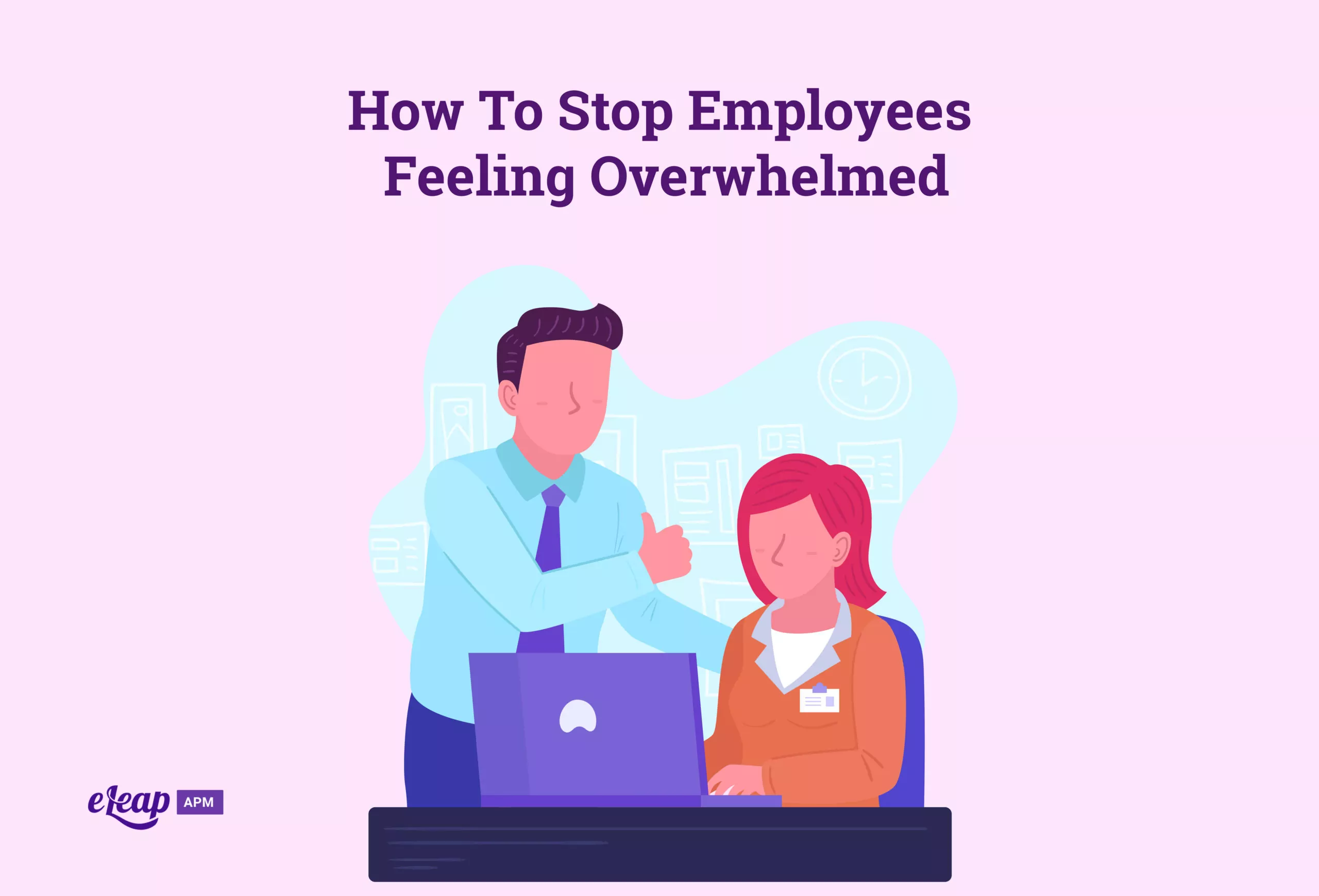How To Stop Employees Feeling Overwhelmed

If you want your employees to perform their jobs to the best of their abilities, it’s important that they don’t feel overwhelmed, stressed, and burnout at work. It’s easy for employees to easily become overwhelmed, particularly if your company is going through a stressful time full of changes. Struggling employees are likely to be much less productive and, if the feeling continues for too long, are more likely to quit, leading to high turnover rates. But luckily, there are some steps you can take to help prevent your employees from feeling too overwhelmed and reduce dreaded burnout.

How to Help Your Employees Feel Less Stressed at Work
You need your employees to be as productive as possible, and you also want them to feel happy and comfortable at work. You want your team to enjoy their jobs, so there are some steps you should take to reduce stress and help employees feel less overwhelmed to avoid burnout.
Learn To Recognize the Signs
Before you can do anything to prevent employees from feeling stressed, it’s important to recognize when they are starting to exhibit signs of feeling overwhelmed. Look for red flags such as irritability, tardiness, or lack of interaction with other team members. Such signs can exhibit symptoms of burnout or that employees are struggling not to feel stressed at work.
Check-In with Employees Regularly
The best way to gauge how your employees are feeling is often just to ask them. While looking for signs of burnout and stress can be helpful, some employees might be good at hiding that they’re struggling. Make the time to regularly check in with your employees to make sure that they aren’t starting to feel too overwhelmed at work. Additionally, checking in regularly will help to remind your employees that you care about their mental health and wellbeing. Even just feeling supported by the company they work for can help to reduce feelings of stress.
Allow For Flexible Scheduling Whenever Possible
If you can, let your employees set their schedule and work remotely, if possible. The ability to work from home might help employees to feel less stress and pressure. They can adjust their schedule more to accommodate their needs. For example, employees who have to juggle childcare might appreciate the ability to work from home a few days a week. This is particularly true for remote employees who are trying to adjust to a return to working in the office. Take advantage of the ability that some employees might have to work from home some of the time. Even though it feels like working in the office is the best way to make sure your employees are being productive, the opposite is often true. Employees who are able to reduce stress by working from home will be decidedly more productive than those who feel overwhelmed and burnt out from having to be at the office all the time.
Encourage Team Activities
Setting some time aside for team-building activities where employees can let loose and enjoy each other’s company in a non-work environment is helpful for alleviating feelings of being overwhelmed. It’s important to emphasize that you understand your employees have lives outside of work, and believe it or not, giving them some time to chat or connect with one another outside of work-related topics is important. The more opportunities you can give your employees to relax and let loose, the more productive they’ll be when it comes time to knuckle down and work hard. Try setting up team events, such as office sporting events or game nights, to help alleviate stress and build feelings of teamwork and comradery. Make sure that these events can also cater to any remote employees so that they don’t feel left out. Additionally, try encouraging your employees to take time to themselves throughout the day, such as on their lunch breaks. Even short periods of time in the day to unwind and talk about things other than work can help to reduce feelings of stress and pressure.
Utilize Performance and Learning Management Systems
You should have performance management and learning management systems in place that help your employees be more productive. Use them. One of the biggest causes of stress and burnout for employees is the pressure to perform aspects of their job they don’t feel competent in. If you have learning management systems that can help your employees feel better prepared and trained, it can significantly reduce stress. Combine your performance management and learning management systems together to help your employees feel as supported as possible. For example, user performance management strategies such as reviews help identify areas where your employees feel stressed or are struggling. Then, use your learning management systems to help train them and improve their knowledge in those areas so they feel more confident and can be more productive. Poor training is also a big reason why new hires might feel overwhelmed. If they aren’t set up for success with proper training materials but are being held accountable for performing their job, it’s likely to cause a huge amount of stress!
Burnout and being overwhelmed are surefire ways for employees to be less productive and ultimately quit their job because they feel so stressed. If you want your employees to exhibit the utmost productivity and work as hard as possible, it’s important you make sure they aren’t feeling overwhelmed. As business starts to pick up following COVID-19, it’s likely employees will start to feel the pressures and stress associated with an influx in business and workload. Make sure to keep stress levels down by allowing them some time to decompress and relax. Show your employees that you care about their wellbeing and don’t want them to feel stressed or overwhelmed. Taking the time to look out for them will seriously pay off in the long run.